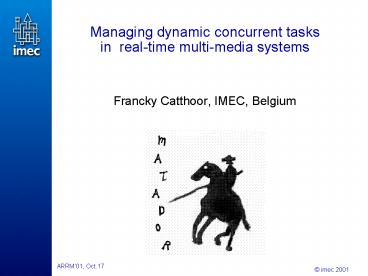Managing dynamic concurrent tasks in real-time multi-media systems - PowerPoint PPT Presentation
1 / 24
Title:
Managing dynamic concurrent tasks in real-time multi-media systems
Description:
Motivation: new challenges in system-level design. Overview of TCM methodology ... Trade-off between time budget (period/latency) and cost (e.g.energy) leads to ... – PowerPoint PPT presentation
Number of Views:24
Avg rating:3.0/5.0
Title: Managing dynamic concurrent tasks in real-time multi-media systems
1
Managing dynamic concurrent tasksin real-time
multi-media systems
- Francky Catthoor, IMEC, Belgium
2
Goal of our research
- A methodology to map dynamic and concurrent
real-time applications on an embedded
multi-processor platform
3
Why are Applications becoming more dynamic and
concurrent?
T1
The workload decreases but the tasks are
dynamically created and their size is data
dependent
4
Divide-and-conquer approach of today leads to
local solutions
MPEG-4 multimedia spec too huge to handle as
1 task gt break up in many interacting tasks
5
Global picture ad hoc
TASK1
Processor 1
h
TASK2
TASK3
6
Global trade-offs with cost-performance curves
TASK1
Processor 1
TASK2
TASK3
7
Outline
- Motivation new challenges in system-level
design - Overview of TCM methodology
- Cost-efficient design-time scheduling
8
Terminal QoS requires new approach
Solution Pareto curves
- Maximize Quality
- Minimize Power
Limited Resources
See session Multi-media 1
9
Very dynamic behaviour so worst-case realisation
too costly
10
System design issues in IT-Application domain
Embedded system gt cost
Network layer protocols (ATM, IP) Dynamic
multi-media algorithms (MPEG4/7/21) Wireless/wired
terminals (Internet, WLAN)
11
Real-time constraints, tasks and data in the
IM1-MPEG4 protocol
Application
Executive
ALManager
Service
Presenter
Data
Flex
Decoders
Critical path
Channel
Demux
BIFS
Data
Decoding Buffer
Composition Memory
Channel
OD
Data
Channel
...
Data
Channel
30 msec
Pre/post Decoding
Rendering
Pre/post writing
12
Why arent multi-processor platforms used now in
embedded domains?
- efficient mapping requires a very high design
effort when done manually - gt need for a cost-sensitive real-time system
compiler
13
Outline
- Motivation new challenges in system-level
design - Overview of TCM methodology
- Cost-efficient design-time scheduling
14
Requirements of system level design approach
Data mngnt
Concurrency mngnt
Platform constraint
TCM approach ICPP00, Kluwer book99
15
TCM steps aim at removing the bottlenecks for
better performance
Optimized system specification
Task1
Task2
Inter-task DTSE
Task concurrency mngnt
Task3
Task-level system architecture
ICPP00, Kluwer book99
16
C/C specification of dynamic concurrent system
Extraction of the gray-box model
17
Outline
- Motivation new challenges in system-level
design - Overview of TCM methodology
- Cost-efficient design-time scheduling
18
Reduce global system energy by task scheduling
assignment (e.g. 2-processor approach )
Taskn
Task2
Task1
Vdd1V
Vdd3.3V
Codes01, J.of Sys.Arch, summer 2001
19
Trade-off between time budget (period/latency)
and cost (e.g.energy) leads to Pareto curves
Cost
Time
CB1
CB2
CB3
CB4
CB5
CB6
20
TCM transformations on applicationmodel shift
Pareto curve to origin
Energy
Bottleneck of case 1
Scheduling alternatives for case 1
Time Budget
21
Comparison for original and transformed IM1
graphs on 2 processors with different Vdd
original
Transformed
22
Comparison between different processor platforms
Combination 2
6
5
4
3
2
1
Global Pareto curve
Combination 3 (Global Pareto curve)
6
5
4
3
2
1
23
Comparison of genetic algorithm (GA) and
heuristic task scheduling results
24
Why run-time scheduler?(I)
- Design-time Scheduler
- Predictability - Schedulability for
- - Flexibility dynamic events
- Run time complexity Optimization
- Run-time Scheduler
- - Predictability Schedulability for
- Flexibility dynamic events
- - Run time complexity - Optimization
25
Overall solution combination of design- and
run-time schedulers
Cases00, DesignTest- Sep.01
26
Main messages
- Embedded multi-media applications are becoming
very dynamic and concurrent in nature gt RTOS
essential - Task Concurrency Management approach provides
the flexibility and optimization possibility
while limiting the run time computation
complexity - A multiprocessor platform with different working
voltages potentially provides an energy saving
solution - Application-specific run-time scheduling
technique combined with design-time scheduling to
provide cost-performance Pareto-curve essential
for effective solution































